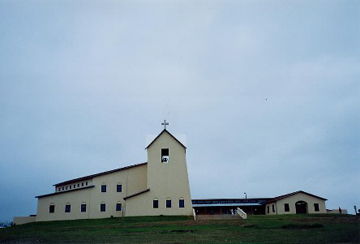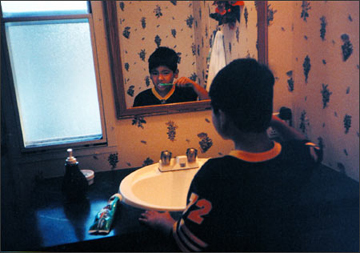

| For more information about this article or gallery, please call the gallery phone number listed in the last line of the article, "For more info..." |
May Issue 2005
Transylvania Community Arts Center in Brevard, NC, Offers Exhibition Dealing with Migration Transitions
 The
Migration Transitions Project: Photonarratives with Latina Immigrant
Women by Deborah Bender
and Melanie Wasserman, is an exhibition opening May 4 at Transylvania
Community Arts Center in Brevard, NC. The project and exhibition
vividly illustrate how sociology fits into the health field. The
exhibit will be on view through May 26, 2005
The
Migration Transitions Project: Photonarratives with Latina Immigrant
Women by Deborah Bender
and Melanie Wasserman, is an exhibition opening May 4 at Transylvania
Community Arts Center in Brevard, NC. The project and exhibition
vividly illustrate how sociology fits into the health field. The
exhibit will be on view through May 26, 2005
The Project studied Latina immigrant women and the role of social support in making the transition to a new community and in accessing health services, particularly preventive healthservices such as prenatal care, immunizations, and cervical cancer screening for women.
Deborah Bender Ph.D., M.P.H., is director of UNC-Chapel Hill's Health Policy and Administration's undergraduate program and is a public health anthropologist whose research and practice focuses on improving the quality of services to women and children through systems interventions and development of interdisciplinary teams in health settings. Melanie Wasserman recently completed her doctoral studies at UNC, focusing on Latino origin, migration, and the use of preventive maternal and child health services in North Carolina.
During the data collection stage of the Migration Transition Project, Bender and Wasserman visited Spanish-language churches in four counties of Piedmont North Carolina. After services, they interviewed women age 15 to 44, asking about the places in which they grew up, what health services they had used there, and their reasons for coming to North Carolina. They also asked about the women's social support - whom they relied on for needed information, for help in accessing health services, and for emotional support. The researchers wanted to know, too, what the ethnic origins of these "bridge persons" were. The eventual intent of the project was to design health programs that included these three important elements of social support to ease the difficulties of the migration transition.
To be sure they had addressed the particular concerns of women, Bender and Wasserman also invited a sub-sample of Latina immigrant women to participate in the project as community photographers. The Migration Transitions Project: Photonarratives with Latina Immigrant Women presents some of the women's photographs as well as the story that each woman offered to explain why she had taken the photograph and what opportunity or challenge the photograph represented to her.

In the conceptualization of the project, Bender and Wasserman were influenced by the work of documentary photographer Dorothea Lange, whose rendering of the lives of displaced women and their families during the Great Depression told a story more powerful than statistics alone. Influenced by the photonarrative works of Wendy Ewald with Durham schoolchildren and Carolyn Wang with rural Chinese women, Bender has collaborated with Latina immigrant women as community photographers since 1996. The photographs taken by these women have guided the development of workshops on Spanish and cultural competency for health professionals across North Carolina and provided models for learner-generated ESL lessons.
These photographs display sharp insights and a remarkable optimism. There is a quality of resilience in the face of potential adversity that speaks to the women's hopes and dreams for themselves and for their children. Most of the photographers are of rural origin and have only limited formal education. It is obvious that they place a great value on personal relationships with family and friends, new and old, Latino and North American.
Though these women reached the United States through a diversity of paths, some more difficult than others, they share common experiences: belief in the strength of the family as a key source of support, hope for better health care and education for their children, and a certain loneliness at being separated from those they left at home.
For further information check
our NC Institutional Gallery listings, call the Center at 828/884-2787
or at (www.tcarts.org).
Carolina Arts is published monthly by Shoestring Publishing Company, a subsidiary of PSMG, Inc. Copyright© 2004 by PSMG, Inc., which published Charleston Arts from July 1987 - Dec. 1994 and South Carolina Arts from Jan. 1995 - Dec. 1996. It also publishes Carolina Arts Online, Copyright© 2004 by PSMG, Inc. All rights reserved by PSMG, Inc. or by the authors of articles. Reproduction or use without written permission is strictly prohibited. Carolina Arts is available throughout North & South Carolina.